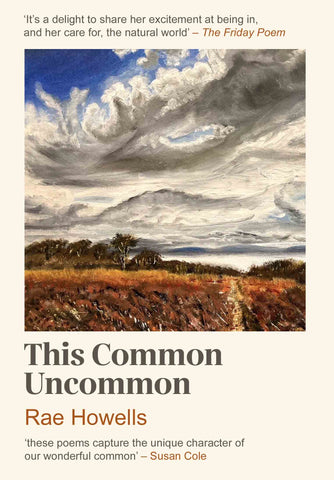When a local common is threatened with development, one poet explores its secrets, discovering extraordinary natural treasures and wonderful people fighting to defend them. Can they save this uncommon common?
Everybody had written it off as waste ground. But when a planning application is made to build houses on this wild and green patch of Gower common, something magical emerges. From the star-nose of the polecat and the bold zigzags of adders to the delicate yellow blooms of a bog asphodel glade, this small patch of common land has revealed dozens of unexpected wonders. Hiding beneath the bracken is a wet heathland, brimming with bog plants, fed by layers of nutrient-rich peat and supporting scores of species, a vanishingly rare habitat in the UK.
Using her nature poet’s eye for detail and treading in the footsteps of the original poet of the commons, John Clare, Howells brings to life the story of this threatened land. Her poems ring with passion for this wild place, recording the many rare plants and animals that will be lost if the common is developed. She asks important questions about land use, about what commons mean to us today, and about who – or what – gets to own and enjoy green spaces. Above all she takes us on a journey of discovery, into the miniature rainforest of this little, almost-forgotten place, where you’ll find the uncommon is a common sight.
'Rae Howells’ latest collection of poetry evokes the wildness and beauty of an unspoilt corner of Swansea locally known as West Cross Common, part of a green corridor that runs from the tip of the Gower peninsula all the way to Swansea Bay... This Common Uncommon is a reminder of the power of poetry to tackle important issues with directness and the power of personal connection.' – Jenny White, the Western Mail
'This is glorious nature writing redolent with colour, texture, smell... Howells has written something worth reading, something driven by both her intense love of this place and her understanding that once such a place is lost, there is the dreadful, empty permanence about its passing' – Pat Edwards, London Grip
'it’s a delight to share her excitement at being in, and her care for, the natural world.' – The Friday Poem
'Howells writes with sensitivity, empathy, liveliness and keen observation... Finely wrought, intelligent, and full of heart... [This Common Uncommon is] an important book that speaks for nature, land, and species which, too often, we see as silent: a vital tome at a time of urgency.' – Mab Jones, Buzz
'West Cross Common is an area of precious wet heathland that is packed with almost 500 species of animals, plants and fungi. Peat-based heathland like this is rarer than rainforest, and these poems capture the unique character of our wonderful common, and shine a light on why we must protect it from development.' – Susan Cole, West Cross Common campaign co-ordinator
‘Can poetry protect the natural world? Can it actually change the course of events? Many poets are attempting to do just that, but it’s not often that a collection is published with a specific purpose, centred on a particular location. Rae Howells’ latest book focuses on West Cross Common, a small area of peat-based heathland on the edge of Swansea, which is currently under threat of development. But these poems do far more than protest. They celebrate the minutiae of a rare and intricate habitat, the kind of inconspicuous scrubland that many of us would normally walk past without a second glance. […] These poems fulfil the author’s aim, stated in the introduction: they ‘give voice to the unheeded – the common itself, the plants and animals that live on it’. But they also dramatize a very real and ongoing tension. This is a book that delights in the small and the inconspicuous, forging a celebratory link between us and the areas of common land that we so often take for granted.’ – Rachel Carney, Created to Read
'The diversity of nature is matched by the diversity of poetic devices: sonnet, riddle, free verse, concrete, prose poetry, persona, speculative, spell, list, and so on. Every poem is a surprise and holds surprises within it. There is vitality here, and wit, and a thrill at being in nature. A profound sense of grief at its possible absence. These are poems to treasure and reread to find ever deeper meanings.' – Paul Brookes, The High Window
You can read Rae's 'On Being a Poet in Wales' article for Nation. Cymru here.

Rae Howells is a poet, journalist and lavender farmer from Swansea. Her debut collection, The language of bees (Parthian), was shortlisted for Wales Book of the Year 2023. She has previously won the Rialto Nature & Place and Welsh poetry competitions and been featured widely in journals including Magma, The Rialto, Poetry Wales, New Welsh Review, Acumen and Poetry Ireland. A keen environmentalist and a believer of the restorative power of wild places, she is poet in residence at Llanelli Wetland Centre. This Common Uncommon is her second poetry collection.
www.raehowells.co.uk

